Share of adults saying the U.S. isn’t providing enough support to Ukraine has declined since March
Pew Research Center conducted this study to better understand Americans’ attitudes about the Russian invasion of Ukraine as well as the Biden administration’s response to the invasion. For this analysis, we surveyed 5,074 U.S. adults in May 2022. Everyone who took part in this survey is a member of the Center’s American Trends Panel (ATP), an online survey panel that is recruited through national, random sampling of residential addresses. This way nearly all U.S. adults have a chance of selection. The survey is weighted to be representative of the U.S. adult population by gender, race, ethnicity, partisan affiliation, education and other categories. Read more about the ATP’s methodology.
Here are the questions used for the report, along with responses, and its methodology.
As the conflict between Russia and Ukraine enters its third month, most Americans say they support actions taken by the Biden administration in response to the Russian invasion, such as placing strict economic sanctions on Russia, sending military equipment and weapons to Ukraine and stationing large numbers of U.S. military forces in NATO countries near Ukraine.
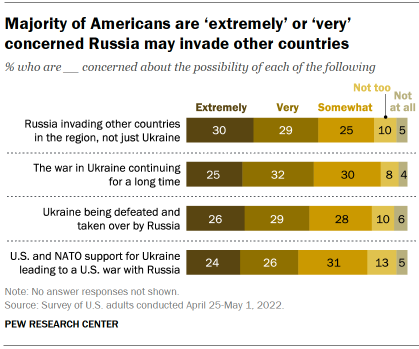
In general, more U.S. adults approve (45%) than disapprove (34%) of the Biden’s administration’s response to the Russian invasion of Ukraine. Views of the administration’s response are largely unchanged since March (when 47% approved and 39% disapproved).
The new Pew Research Center survey, conducted April 25-May 1, 2022, among 5,074 U.S. adults found that the public has multiple concerns over possible consequences from the war in Ukraine. Roughly six-in-ten (59%) are extremely or very concerned about the possibility of Russia invading other countries in the region, while another 25% are somewhat concerned; 15% are not too or not at all concerned.
Similar shares are at least very concerned about the war in Ukraine possibly continuing for a long time (57%) and Ukraine being defeated and taken over by Russia (55%).
About half of Americans also say they are either extremely (24%) or very (26%) concerned about the possibility of U.S. and NATO support for Ukraine leading to a U.S. war with Russia, with about one-third also saying they are somewhat concerned about this. Only about one-in-five (18%) say they are not too or not at all concerned about this.
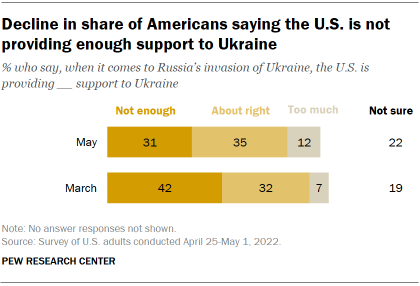
Opinions about the level of support the United States is providing to Ukraine have changed since March. Currently, 31% say the U.S. is not providing enough support to Ukraine, while 35% say its support is about right; 12% say the U.S. is doing too much. The share of Americans who say the U.S. is doing too little to support Ukraine has declined 11 percentage points since March, from 42% to 31%.
In late April, President Joe Biden proposed a massive package of military and economic assistance to support Ukraine and U.S. allies in the region, more than doubling the aid the U.S. has provided thus far during the conflict.
The public’s views of the Biden administration’s response to Russia’s invasion of Ukraine have changed little since March. However, these opinions have shifted somewhat within each party.
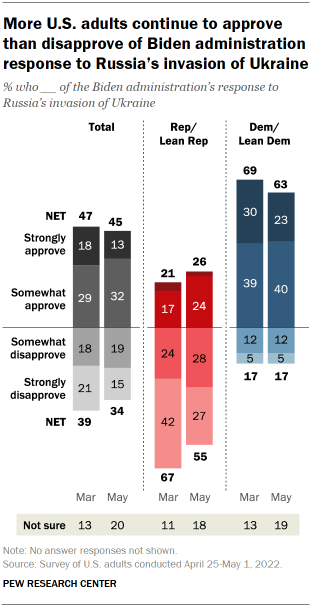
Among Republicans and Republican-leaning independents, the share who disapprove of the Biden administration’s response to the Russian invasion has declined since March. Two months ago, two-thirds of Republicans said they disapproved of the administration’s response; today, a smaller majority (55%) disapproves. The share of Republicans who strongly disapprove of the Biden administration’s handling of the situation has declined by 15 points (42% in March, 27% now).
Among Democrats and Democratic leaners, there has been a decline in the share saying they approve of the Biden administration’s response to the Russian invasion. In March, 69% approved, including three-in-ten who strongly approved. That is down to 63% today, with 23% who strongly approve. Equal shares of Democrats say they disapprove today as did in March.
Large majorities of Americans support various actions taken by the U.S. in response to the Russian invasion. Three-in-four Americans approve of the U.S. placing strict economic sanctions on Russia, including more than half who strongly approve. About one-in-ten say they disapprove (12%), while a similar share is unsure (13%).
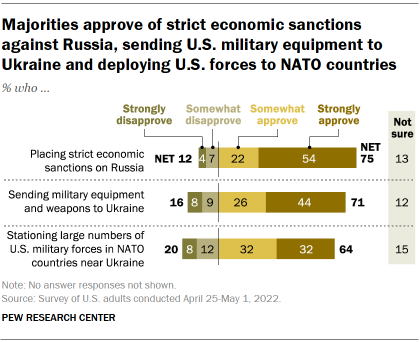
The U.S. decision to send military equipment and weapons to Ukraine also draws strong support from the public: 71% say they approve this action, while just 16% disapprove. About one-in-ten (12%) say they are not sure.
Nearly two-thirds (64%) also approve of the U.S. decision to station large numbers of U.S. military forces in NATO countries near Ukraine. One-in-five Americans disapprove of this decision, while 15% are not sure.
Wide support in both parties for U.S. actions in response to Russia’s invasion of Ukraine
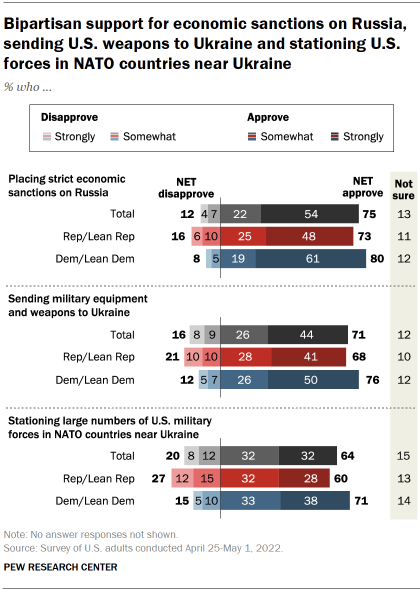
Large majorities of both Republicans and Democrats say they approve of all three U.S. actions included in the survey.
Sizable majorities of both Republicans (73%) and Democrats (80%) say they approve of the U.S. placing strict economic sanctions on Russia. Similar shares say they approve of sending military equipment and weapons to Ukraine.
About seven-in-ten Democrats and six-in-ten Republicans also say they approve of stationing large numbers of U.S. military in NATO countries near Ukraine.
While there is bipartisan approval on all three U.S. actions surveyed, Democrats are somewhat more likely than Republicans to say they strongly approve of each of the actions.
For example, 61% of Democrats strongly approve of placing economic sanctions on Russia, compared with 48% of Republicans who say this. There are similar differences in strength of opinion on sending weapons to Ukraine and stationing U.S. military forces in nearby NATO countries.
Overall, about a third of Americans (35%) say that the U.S. is providing about the right amount of support to Ukraine, while a somewhat similar share (31%) say the U.S. is providing not enough support. Just 12% of Americans say the U.S. is providing too much support, while roughly one-in-five are not sure.
Among Republicans and Republican-leaning independents, roughly similar shares say that the U.S. is either providing too little (34%) or about the right amount (30%) of support to Ukraine. About one-in-five Republicans say that the U.S. is providing too much support.
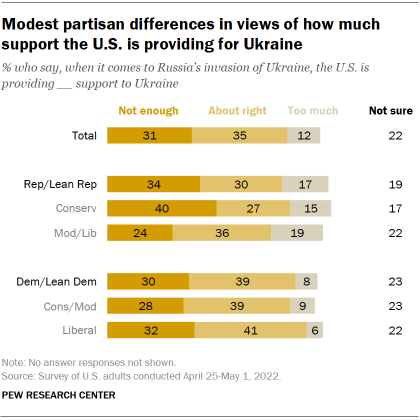
Conservative Republicans are somewhat more likely than liberal and moderate Republicans to say that the U.S. is providing too little support to Ukraine (40% vs. 24%).
Among Democrats and Democratic-leaning independents, nearly four-in-ten say that the U.S. is providing about the right amount of support for Ukraine. Three-in-ten say that the U.S. is providing too little support, and 8% think the U.S. is giving Ukraine too much support.
There are not substantial differences among Democrats by ideology.
While opinions about U.S. efforts to support Ukraine do not differ widely along partisan lines, this also is generally the case for concerns about the conflict. For example, while 62% of Democrats say they are extremely or very concerned about the possibility that Russia could invade other countries in the region, 56% of Republicans also express that level of concern. Comparable shares in both parties also say they are extremely or very concerned that U.S. and NATO support for Ukraine could lead to a war with Russia (51% of Democrats and 48% of Republicans are at least very concerned).
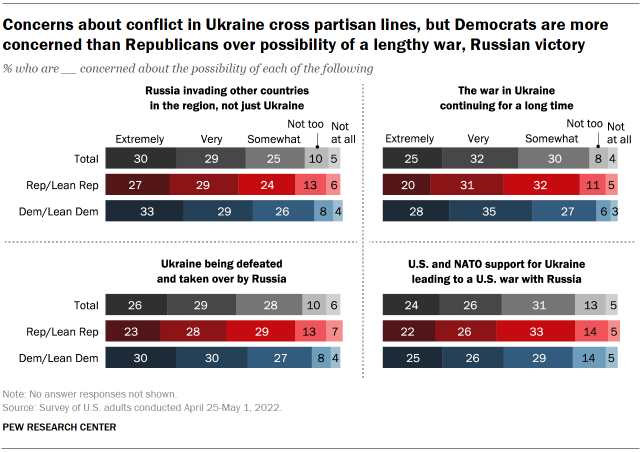
Democrats are more likely than Republicans to be at least very concerned about the war in Ukraine continuing for a long time (63% vs. 51%) and Ukraine being defeated and taken over by Russia (60% vs. 51%).




